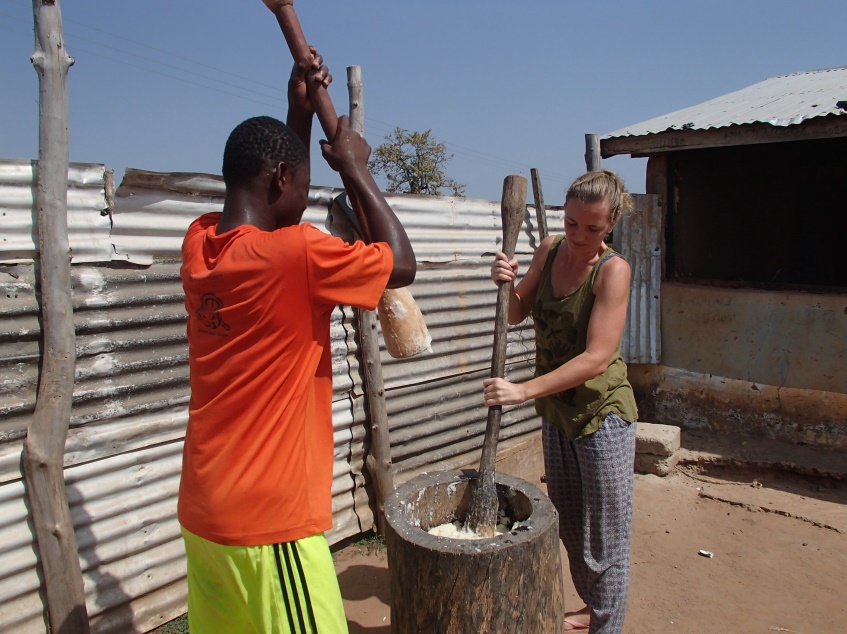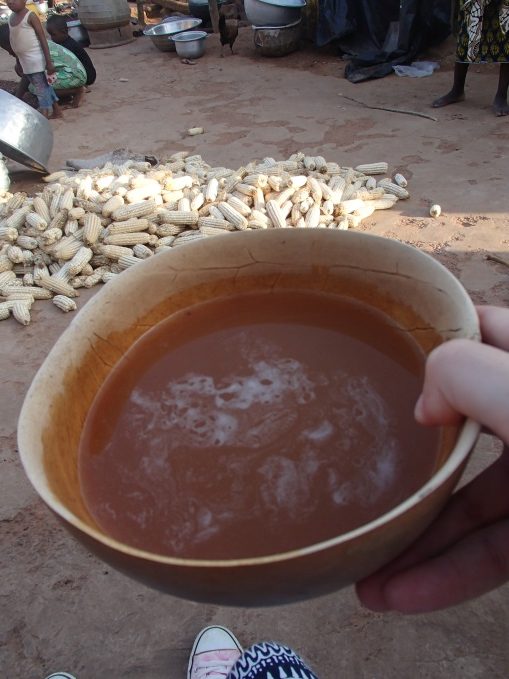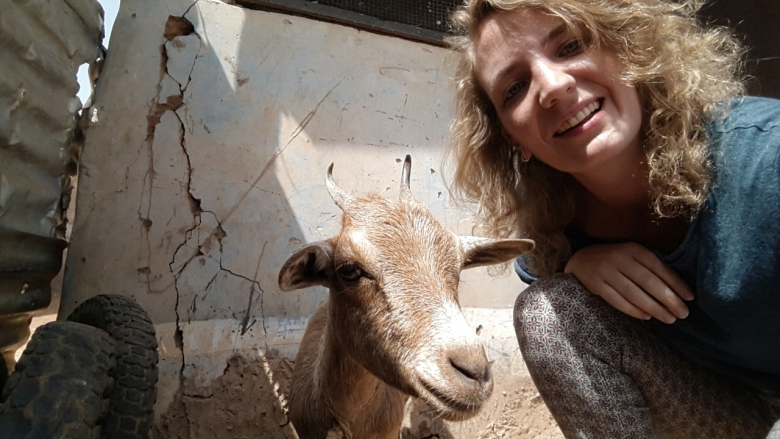In the beginning of October I left the cold of the Netherlands for Ghana for 5 months to do my final medical internship in the West Gonja Hospital (WGH) in Damongo. The West Gonja area is thinly populated, so many people have to travel for several hours to reach our hospital. The hospital contains several wards: the female and male ward, paediatrics, maternity, accidents & emergency and the public health unit. During my stay I rotated in most of the wards.
Just being there was a lot of getting used to. A lot of what I considered normal in the Netherlands, is totally different in Ghana. Damongo is only a small town, so it could be difficult to find entertainment for the hours I wasn’t in the hospital. Luckily I made plenty of local friends in the first weeks to hang out with. They taught me how to ride a motorbike, we watched movies and football or went out to the local bar for a drink.I planned the first two weeks of my stay to be fairly calm, so I could get used to the country, its culture, its people and the hospital. In my first workdays I followed some of the local doctors just to observe the way they work and I wrote down as much as possible, so that I could quickly work independently.
An ordinary day for me in Damongo started around 8 am, doing rounds on my ward. Here I was responsible for all patientcare for the patients on my ward. This was far more responsibility than I was used to get in hospitals in the Netherlands. Fortunately the local doctors were very kind and helped me out whenever I had a question or wanted to discuss a certain case.
 I noticed a big cultural difference between Ghana and the Netherlands in the OPD. In general, the Ghanaian mindset is as such: ‘I have certain symptoms, which means I’m ill, which means I will go to the doctor, which means the doctor will give me medicine. The more medicine I get, the better the doctor is.’ I’m used to not prescribing medication that easily and will usually first tackle certain lifestyle habits that can cause the symptoms. I often found it very challenging to remain by my personal beliefs, but also make sure the patient goes home satisfied.After rounds I went through to the Out Patient Department (OPD). This is a kind of general practitioners practice, where patients come with all sorts of mild complaints such as headache, fever, cough, back pains, etc. In most cases patients could be treated at the OPD and given medicine and/or advice to take home. The challenge here was to identify the patients that do have a serious condition and should be admitted or transferred for further investigation and management. However, there is a limit to the kind of tests and treatments that the WGH has available, so you really had to learn to trust your gut feeling.
I noticed a big cultural difference between Ghana and the Netherlands in the OPD. In general, the Ghanaian mindset is as such: ‘I have certain symptoms, which means I’m ill, which means I will go to the doctor, which means the doctor will give me medicine. The more medicine I get, the better the doctor is.’ I’m used to not prescribing medication that easily and will usually first tackle certain lifestyle habits that can cause the symptoms. I often found it very challenging to remain by my personal beliefs, but also make sure the patient goes home satisfied.After rounds I went through to the Out Patient Department (OPD). This is a kind of general practitioners practice, where patients come with all sorts of mild complaints such as headache, fever, cough, back pains, etc. In most cases patients could be treated at the OPD and given medicine and/or advice to take home. The challenge here was to identify the patients that do have a serious condition and should be admitted or transferred for further investigation and management. However, there is a limit to the kind of tests and treatments that the WGH has available, so you really had to learn to trust your gut feeling.
Another big cultural difference that I encountered in the hospital, is that a lot of Ghanaians firmly believe in traditional healing, in which witchdoctors heal patients using herbs, spells or bizarre and extreme means. We very often saw complications, mostly after these extreme treatments (for example, forcefully making deep incisions in a lower leg after a snake bite ‘to drain the venom’), such as bad infections or dying limbs. Sometimes family members even took their very ill or badly injured relative home, against doctors’ advice, to get treated by a traditional healer. Sadly, this did not always end well.
My working day usually finished around 3 to 5 pm, when there were no more patients in the OPD. In the afternoon I usually took some time to relax at home, reading a book or watching a movie or series. I was sometimes joined by one of my local friends for this. In the evening Kassim, the nightwatch, came around, usually with his family. We usually sat outside, had dinner together, drank tea, played games or went to a place where they brew their own local beer, pito.
 On Friday evenings I usually went out for drinks with the local doctors and medical students at ‘Canteen Canteen’, a small bar behind the hospital. Well… bar… It is basically a fenced off area where you can sit on plastic chairs at plastic tables, where the music is very loud and they serve cold drinks. Everything you need for a good conversation!
On Friday evenings I usually went out for drinks with the local doctors and medical students at ‘Canteen Canteen’, a small bar behind the hospital. Well… bar… It is basically a fenced off area where you can sit on plastic chairs at plastic tables, where the music is very loud and they serve cold drinks. Everything you need for a good conversation!
There are, of course, many differences between Dutch and Ghanaian culture. For instance, the way religion plays a huge role in everyday life in Ghana. All differences provide for good discussions, which I had regularly. Thankfully, these discussions had a friendly nature and ensured that I learned a lot about Ghanaian culture, and that they learned mine. Of course we had disagreements, very often actually, but it was actually real good entertainment to notice how some things, that Dutchies consider the most normal things in the world, could be really bizarre for them, and the other way around as well.
I usually worked during the weekends as well (on Sunday thankfully only in the morning) but every so often I would take a weekend off. In about an hours’ drive is the Mole National Park, the biggest wildlife park in Ghana. Its motel is quite shabby, but the staff are really very friendly and it is a nice place to meet some other obrunis (white folks) and do either a walking or jeep safari in the park. They also have a pool, which is very welcoming after several weeks of dusty Damongo.
I also spent some time in Tamale, Ghana’s third biggest city, which is not far from Damongo. In Tamale you can find an actual supermarket, a bank to get some cash and several restaurants that serve burgers or pizza (very awesome after weeks of only TZ, banku or fufu).
Another experience that I will always remember is celebrating the holidays in Ghana. Again, religion plays a big role here. Catholic Ghanaians will usually spend both Christmas days in church. Also New Year’s Eve is usually celebrated in the church or mosque. Just like in the Netherlands, it is very common to give gifts to friends and relatives, only there is a big difference in the type of gifts you would get. In Ghana it is very common to give somebody a bag of rice or a cooking pot for Christmas or New Years’. Because I didn’t want to stay behind in the local customs, I bought a goat for Kassim and his family, which we butchered and barbecued on New Years’ Day. It was a big feast for them, for which they had invited some close friends as well. It was really amazing to have been a part of that.
 After my holidays I only had a few more weeks left in Damongo until the end of my internship. In these weeks I mostly worked, but also spent time at Mole and with my friends in Damongo. Until it was the end of February and it was time for me to say goodbye. After many thank you’s and exchanging email addresses the time had come for me to go home after a truly amazing experience!Besides a few days in Mole and Tamale I also had two weeks of holiday in January, which I used to travel around the country. Ghana is huuuuuge so it was not enough to cover everything, but I decided to at least visit the major cities. I spent my time mostly in Kumasi (very big, very African city), Cape Coast (seabreeze!) and Accra (huge, very Westernized city). Ghana really is an amazing country and it is definitely worth it to spend some time to experience it.
After my holidays I only had a few more weeks left in Damongo until the end of my internship. In these weeks I mostly worked, but also spent time at Mole and with my friends in Damongo. Until it was the end of February and it was time for me to say goodbye. After many thank you’s and exchanging email addresses the time had come for me to go home after a truly amazing experience!Besides a few days in Mole and Tamale I also had two weeks of holiday in January, which I used to travel around the country. Ghana is huuuuuge so it was not enough to cover everything, but I decided to at least visit the major cities. I spent my time mostly in Kumasi (very big, very African city), Cape Coast (seabreeze!) and Accra (huge, very Westernized city). Ghana really is an amazing country and it is definitely worth it to spend some time to experience it.
Read more: Jeffrie Buckle: GEZP

You must be logged in to post a comment.